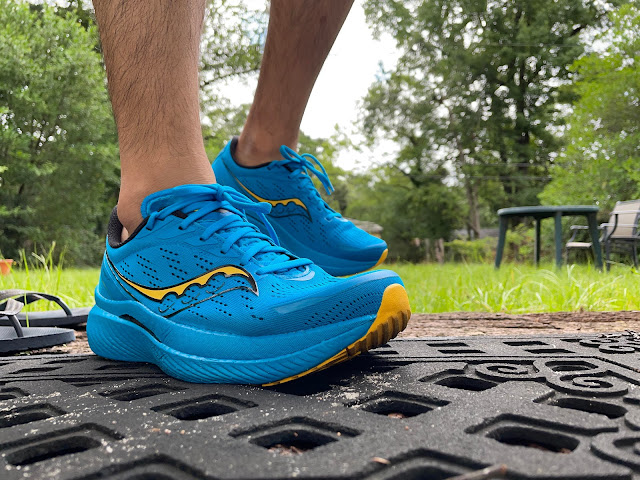Today Nate & Matt review the much-anticipated Saucony Endorphin Speed 3! The new version is, in our opinion, better than ever, boasting a wider platform, more stability, and the same bouncy PWRRUN PB midsole foam. They also tackle a bunch of listener questions about the Speed 3 including: how soft is it? How's the heel stability? How does it compare with the new Saucony Tempus?
PS: Full Endorphin Speed 3 review here.
Video
Sponsor: Karhu!
This episode sponsored by Karhu. You might know they make a collection of running shoes, but for before or after the run, you can be sure to look good with Karhu's Lifestyle collection. They've recently released fresh seasonal colors to ensure you're stylin' going to and from the track. Go to Karhu.com and use promo code DOR2022 at the time of checkout to receive 20% off from the lifestyle assortment when you purchase $100 or more.
Chapters
0:00 - Introduction
0:54 - The Subjective: What makes a shoe soft for you?
09:40 - Saucony Endorphin Speed 3 Review
14:11 - Is the Speed 3 softer? How does it perform at slower paces?
18:00 - How stable is the Speed 3?
28:16 - How does the bounce of the Speed 3 compare to the Rebel V2 and Novablast?
31:51 - Why is stability important to us?
36:38 - How does the Speed 3 compare with the Tempus?
39:55 - Is there anything for the next version of the Speed to improve on?
44:43 - Do we measure the durometer of midsoles?
47:59 - Wrap-up
Science Blog: What does lateral heel wear mean?
By Chief Editor Matt Klein
While this is only briefly mentioned in the research, I often look for asymmetrical wear patterns. Generally more wear on one shoe versus the other makes me suspect either weakness, abnormal biomechanics or possible leg length discrepancies. Most individuals will land harder on sides that have poor eccentric strength and will instead use joint loading instead of muscle loading for shock attenuation. While asymmetry to a certain degree in the human body is normal, excessive is not and can (but not always) be predictive of injury risk. However, this can also occur if you tend to run or turn asymmetrically in some fashion. An example being if you run on a track exclusively in one direction. You are constantly going one direction, which places asymmetrical loads on each side of the body. That is why I am a huge proponent of doing workouts both ways on the track for athletes to reduce risk for asymmetrically induced overuse injuries (a common issue I see is sacroiliac joint issues, but this is anecdotal). Another great example of this is running on the same side of the road all the time. The cant of the road acts like a wedge and will cause asymmetric loading if you don't find a level surface or make sure you spend equal time on the other side.
Recent Episodes
#92: Runner's Knee 101
#93: "Our 3000 Mile Journey"
#94: Surviving the Summer Heat
#95: Science of Designing Running Shoes
#96: Science of Biomechanical Shoe Testing
Recently at Doctors of Running
Mizuno TC11 - A unique training shoe that uses pods to help with ground feel
Asics Metaspeed Sky+ - A big update to the super shoe stride racer
Topo Athletic Pursuit - A solid trail runner for almost any situation
Puma Run XX Nitro: A women's specific trainer with broad stability elements
XTEP 160x Pro - A super stacked, carbon plated shoe from the Chinese brand
Follow Doctors of Running on Social Media
Facebook: Doctors of Running
Youtube Channel: Doctors of Running
LinkedIn: Doctors of Running
Instagram: @doctorsofrunning
Twitter: @doctorsrunning
Podcast: Virtual Roundtable
Please feel free to reach out, comment and ask questions!
Contact us at doctorsofrunning@gmail.com
NEXT: Asics Metaspeed Sky+










